Advocates were taught psychological techniques for maintaining stability during speeches

Confidence during public speaking can be seen as a skill that is developed through practice, regular attention to one's own body, and a willingness to make mistakes and learn from them.
During the webinar «Anchors of confidence: how to manage your emotional state during public communication», practical psychologist Tetyana Sova explained how the mind and body react to interaction and what tools can help maintain a working state.
According to her, when a person finds themselves in a situation that the psyche perceives as potentially dangerous, the sympathetic nervous system is activated. If the nervous system «reads» a public speech or interaction with the audience as threatening, the amygdala is activated, cortisol and adrenaline levels rise, and the body reacts with tension. This can manifest as rapid heartbeat, muscle tension, a lump in the throat, clenched jaw, trembling, reddening of the skin, shallow or rapid breathing.
First, the speaker emphasized, the body reacts, and only then does the person begin to realize this reaction through emotions and thoughts. Statistically, the psyche most often interprets such states as fear, shame, or anger. Fear signals the need to restore a sense of security, shame is associated with feeling overly visible and the desire to «hide» and anger can be directed both outwardly and inwardly, indicating a feeling of violation of one's own boundaries or rejection.
A separate section of the webinar was devoted to how these reactions are influenced by previous experiences, established life scenarios, and cognitive biases. The psyche reacts physically in the same way to both real situations and memories or fantasies about them. If a person constantly «replays» an unsuccessful performance in their head or imagines a future event in a negative light, the body triggers the same physiological chain reaction over and over again. Therefore, Tetyana Sova noted, it is important to notice such thoughts, bring yourself back to the reality of the «here and now» and blur rigid internal scenarios such as «it's always like this for me».
Another tool that the speaker talked about is reframing — rephrasing your own attitudes. T. Sova gave examples of common thoughts such as «everyone notices my insecurity» or «I need to be liked by everyone» and suggested looking for more realistic formulations that do not leave a person in a position of constant evaluation by others.
The central theme was the so-called anchors of confidence. The psychologist defined them as an external or internal stimulus (a gesture, word, touch, sound, smell, or mental image) that helps to evoke a certain emotional state. For such an «anchor» to work, it is associated with moments when a person is already in a state of calm, confidence, or ease. For example, when you feel stable and focused, you can consciously repeat the same small movement. According to the speaker, with regular repetition over several weeks, the psyche begins to associate this gesture with the desired state, and it can be used before or during public communication.
To quickly stabilize your state, the psychologist advised paying attention to your breathing — especially exhaling, which helps slow your pulse—and also looking for support in your body: feeling your feet on the floor, the back of the chair, placing your hand on your chest or solar plexus. Among the simple techniques, she also mentioned rhythmic light tapping on the arms or legs, which can be done discreetly even during a speech.
Separately, T. Sova emphasized the importance of recording positive experiences. After a communication that went better than expected, it is useful to consciously analyze what happened at the beginning, what worked in the process, and what skills can be taken with you for the future. This allows you to form a different scenario, one that differs from catastrophic expectations, and rely on it in future situations.
The webinar «Anchors of confidence: how to manage your emotional state during public communication» was another event within the special project «Supporting the mental health of Ukrainian advocates during the war», initiated by the Ukrainian National Bar Association with the support of the International Bar Association (IBA) and aimed at maintaining the psychological stability and professional effectiveness of advocates.
Popular news
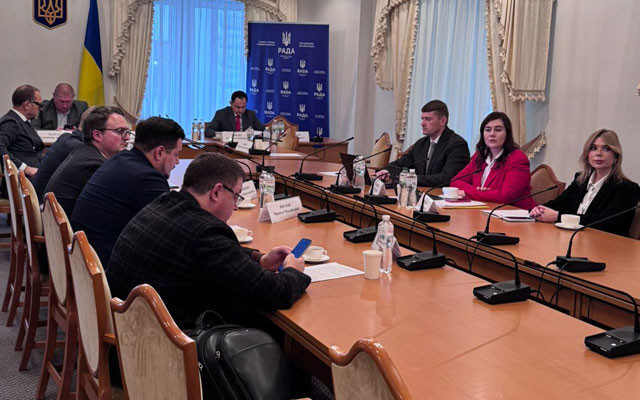
Guarantees of the practice of law
The Verkhovna Rada took another step towards ratifying the Convention on the protection of the profession of advocate
On November 5, the Verkhovna Rada held a working meeting dedicated to the translation of the Council of Europe Convention on the protection of the profession of advocate for its subsequent signing and ratification. The issue was initiated by the Ministry of Foreign Affairs, which drew attention to the key term «lawyer» in the international treaty.
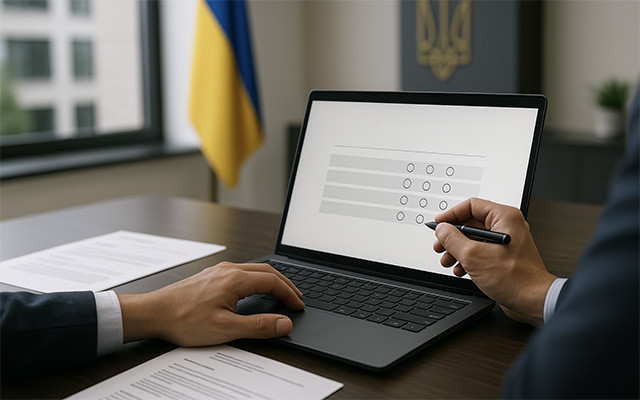
Interaction
NACB is looking for corruption risks in its activities. Advocates are asked to help
The National Anti-Corruption Bureau of Ukraine has launched a survey aimed at gathering information to identify corruption risks in the activities of the National Bureau and prepare an Anti-Corruption Program for 2026–2028.
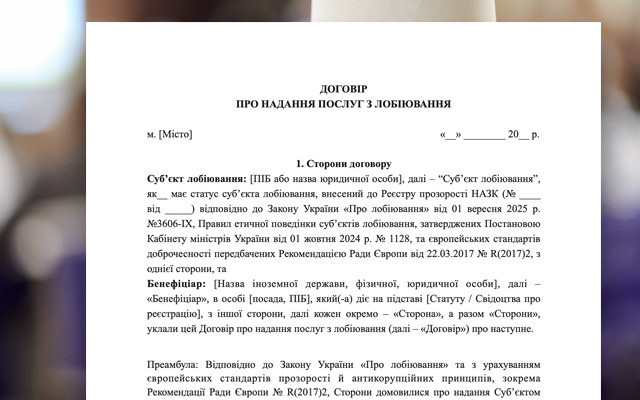
Interaction
Agreement on the provision of lobbying services: a template for advocates has been developed by the UNBA
The Ukrainian National Bar Association has prepared a model agreement for the provision of lobbying services that complies with the requirements of the relevant law and takes into account the specific features of such activities carried out by persons providing legal assistance.
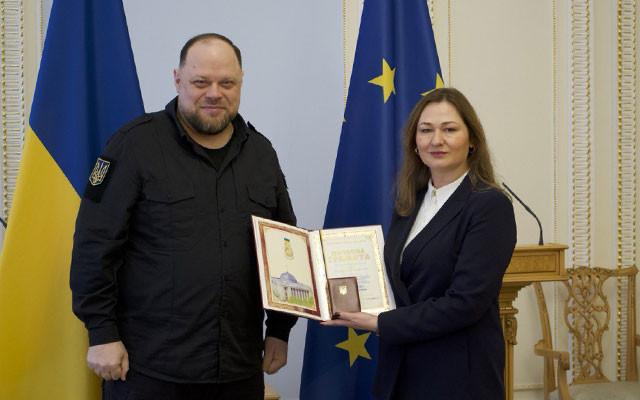
Greetings
Nana Bakayanova awarded with the Certificate of honor of the Verkhovna Rada of Ukraine
Nana Bakayanova, head of the Department of judicial, law enforcement and advocacy organizations at the Odessa Law Academy and secretary of the disciplinary chamber of the Odessa Region Qualification and Disciplinary Commission, received a Certificate of honor from the Verkhovna Rada of Ukraine.
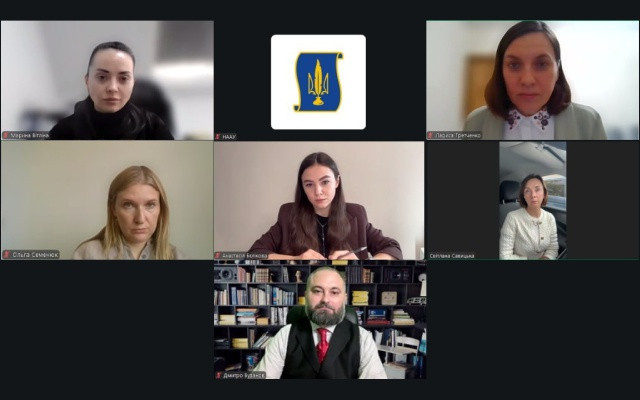
Discussion
Law and feelings: advocates explore contemporary challenges in family law
Marriage and divorce are not only legal procedures, but also social phenomena that require a responsible approach. The UNBA Committee on family law organized and held a professional discussion on the topic «Conscious» marriage and «prudent» divorce: challenges, risks, consequences».

Practice of law
BCU strengthens its position on the right of advocate to prioritize cases
In legal practice, it is not uncommon for court hearings in different cases to be scheduled at the same time. This raises the question: which case should the advocate attend first, and can the court interfere with this decision?
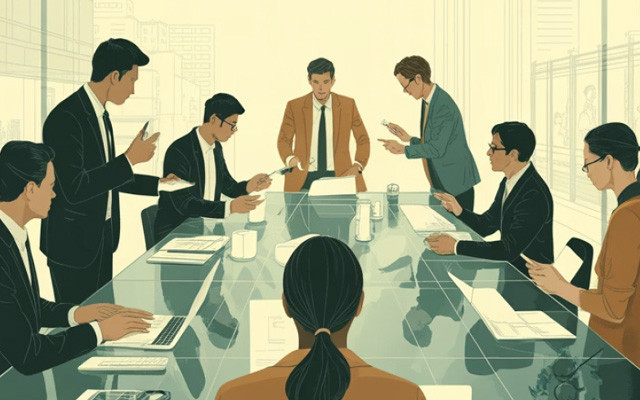
Edition
Advocate or lobbyist? The UNBA has presented a guide to distinguishing between the professions
The Ukrainian National Bar Association has prepared a guide that helps distinguish between the legal status of an advocate and a lobbyist, explains the limits of permissible activities for each, and prevents possible violations of ethical and legal standards when participating in public policy-making.

Announcements
Essay contest on the synergy of human and artificial intelligence in diplomacy has begun
The Educational and Scientific Institute of International Relations at Taras Shevchenko National University of Kyiv invites students from higher education institutions in Ukraine to participate in the Second All-Ukrainian essay competition on the topic «Modern Ukrainian diplomacy: synergy of human and artificial intelligence in defending national interests».
Publications

Censor.net Protecting advocates – protecting justice: addressing concerns about the new law

Ihor Kolesnykov A BRIEF SUMMARY REGARDING THE APPLICATION OF THE ORDER ON EXTENDED CONFISCATION IN LATVIA REGARDING FINANCIAL ASSETS OF…

Valentyn Gvozdiy WORKING IN A WAR ZONE

Lydia Izovitova Formula of perfection

Sergiy Vylkov Our judicial system is so built that courts do not trust advocates

Iryna Vasylyk Advocacy in the proclamation of Independence of Ukraine

Oleksandr DULSKY When we cross the border of the Supreme Anti-Corruption Court, we get into another department of the National Anti-Corruption…

Vadym Krasnyk The UNBA will work, and all obstacles and restrictions are only temporary inconveniences
